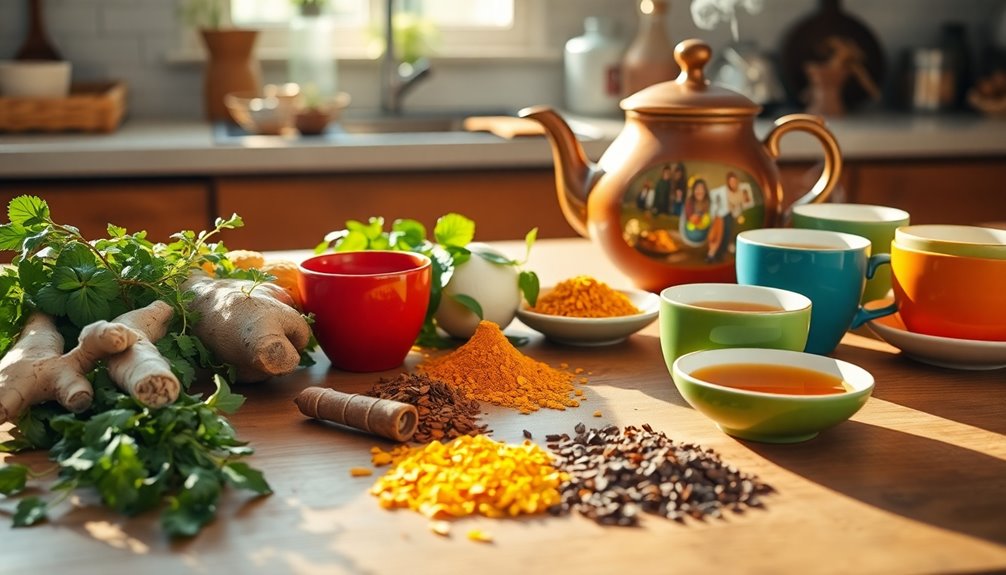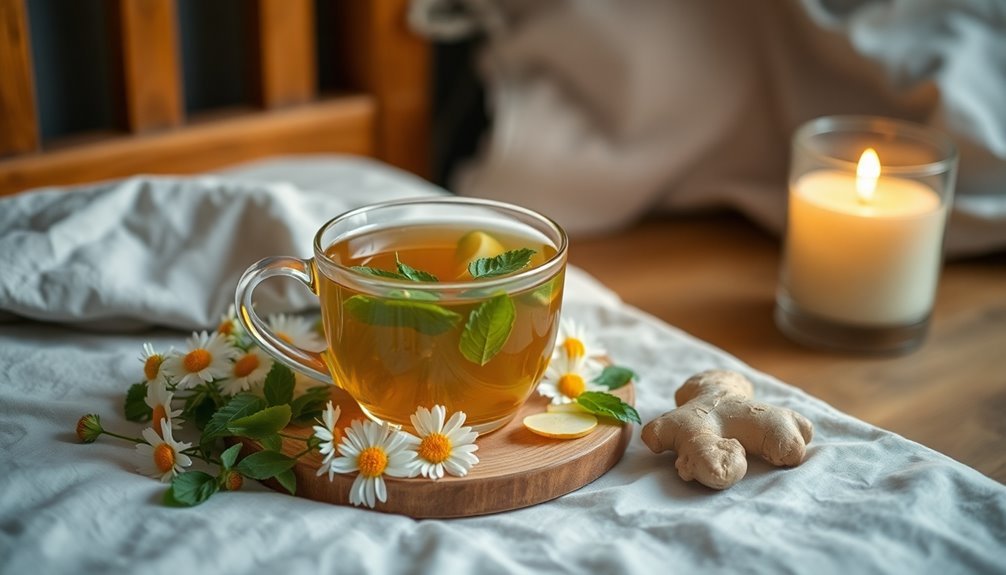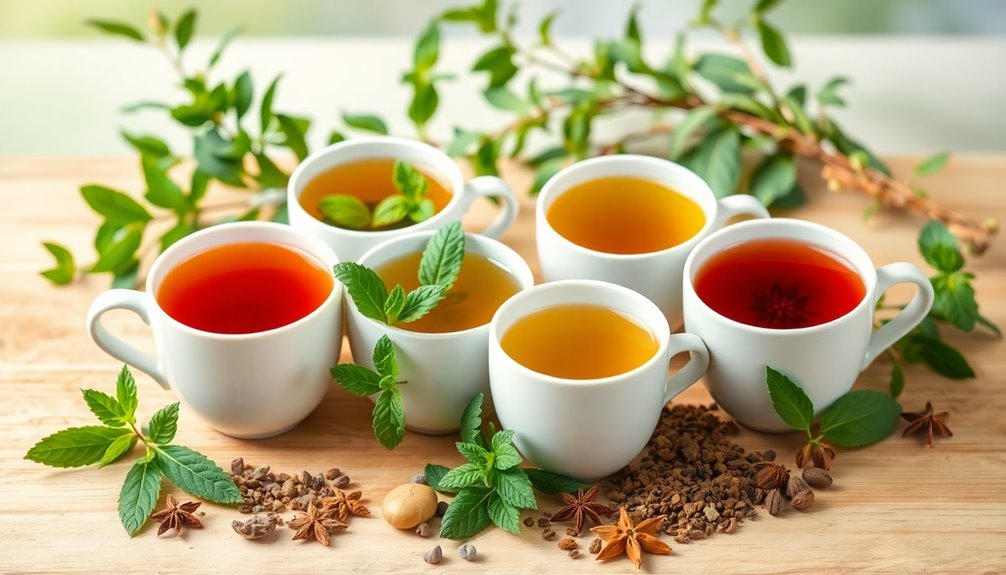If you want to heal your gut naturally, herbal teas are a fantastic choice! Try brewing a ginger tea to soothe nausea or a fennel tea to ease bloating. Chamomile is great for calming your tummy, while peppermint can add a refreshing zing and help digestion. You can even mix in a bit of cinnamon for extra flavor and health benefits! These teas not only taste good, but they also promote a happy gut by reducing discomfort and supporting digestion. You'll discover more tasty and healing tea recipes that can keep your tummy smiling!
Key Takeaways
- Brew a soothing ginger and chamomile tea to alleviate nausea and promote healthy digestion.
- Combine fennel seeds and dandelion root for a tea that reduces gas and stimulates bile production.
- Create a marshmallow root and slippery elm blend to protect the gut lining and calm inflammation.
- Enjoy cinnamon-infused herbal tea for its antimicrobial properties and to tone the digestive tract.
- Mix peppermint leaves with licorice root in a tea to support liver function and enhance digestive comfort.
Introduction
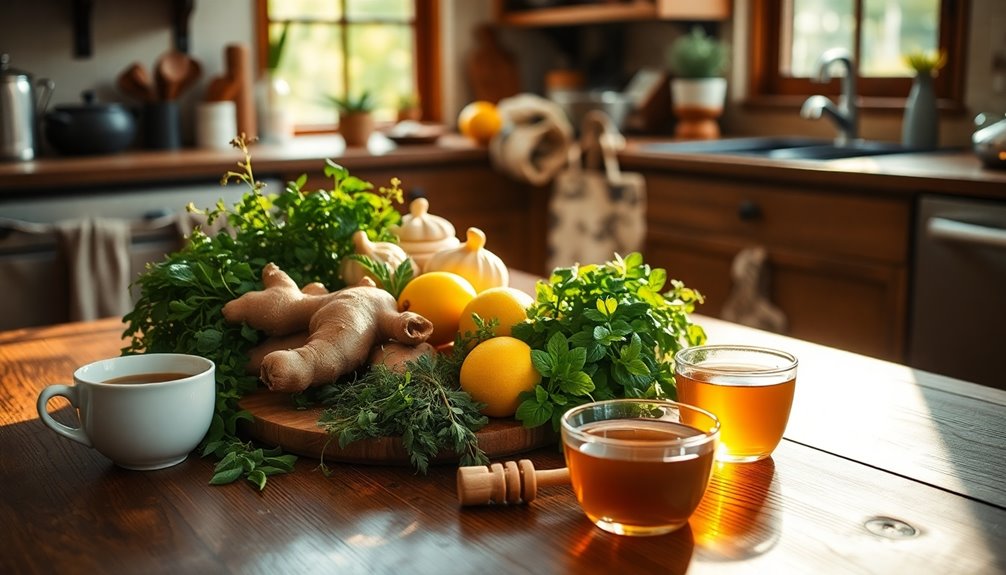
When you're looking to improve your gut health, herbal teas can be a simple yet effective solution. These delightful drinks not only taste great, but they also work wonders for your digestive system.
Imagine sipping on a warm cup of peppermint tea, which can help relieve symptoms like bloating and gas. Ginger tea is another fantastic option, known for its ability to soothe indigestion and promote good digestion.
You might also enjoy dandelion root tea, packed with prebiotic goodness that nourishes the friendly bacteria in your gut. Drinking herbal teas regularly can stimulate your digestive juices and help keep your system running smoothly. Additionally, incorporating oolong tea into your routine may provide antioxidants and health benefits that support overall digestion and gut health.
Plus, the ritual of brewing and sipping these calming teas encourages mindfulness, making it a perfect way to practice self-care.
Herbal Tea Benefits for Digestion
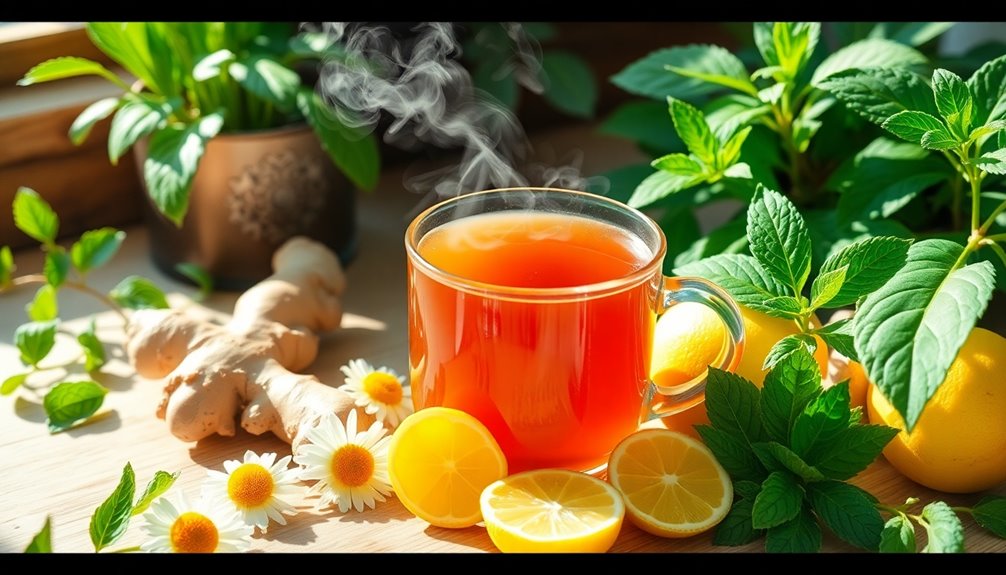
Herbal teas offer a range of benefits for digestion, making them a smart addition to your wellness routine. These delightful drinks can help you feel better when your stomach isn't happy. For example, peppermint and ginger herbal teas relax your digestive muscles and help your body produce digestive juices. This means you can enjoy your meals without discomfort! Additionally, using essential oils like peppermint oil can enhance the soothing effects of your herbal tea. Moreover, incorporating herbs known for their anti-inflammatory properties can further support your digestive health. Regular consumption of turmeric tea can also aid in digestion and relieve constipation.
Ingredients like fennel seeds are especially helpful, as they prevent gas and bloating, while chamomile is known for calming intestinal spasms. Drinking these herbal teas serves as a natural remedy for pesky digestive issues like bloating and gas.
Plus, many herbal teas are packed with antioxidants, which can reduce inflammation in your tummy and support a healthy gut microbiome. Additionally, herbal teas like ginger contain anti-inflammatory properties that may aid in reducing digestive discomfort.
Regularly sipping herbal teas can help keep your digestive health in check. They promote regular bowel movements and stimulate natural digestive juices, contributing to your overall wellness.
Digestive Herbs Enhance Gut Health
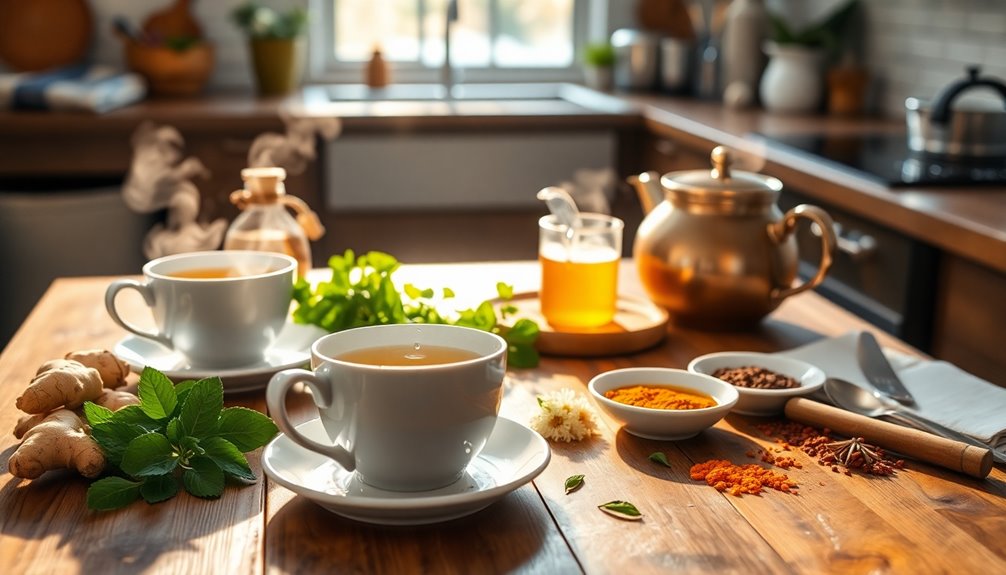
Digestive herbs are your allies for enhancing gut health, offering powerful relief from discomfort like bloating and nausea. These herbal wonders, such as fennel and ginger tea, are known to soothe your digestive system and promote digestion. Fennel not only adds a yummy flavor but also helps reduce gas and tummy troubles. Additionally, tick removal from pets is important, as pets can sometimes experience digestive issues related to tick-borne diseases.
Don't forget about marshmallow root! This special herb creates a protective lining in your gut, which can help calm inflammation and irritation. It's like a cozy blanket for your digestive system! Moreover, certain essential oils, like peppermint oil, can also support digestive health by alleviating feelings of nausea and promoting comfort.
Cinnamon is another fantastic choice; its gentle astringent properties can tone your digestive tract while providing health benefits like fighting off bad germs. Additionally, many of these herbs contain antioxidants that can support overall health and enhance your body's ability to heal.
Incorporating these herbs into your daily routine can make a big difference. Herbal infusions can help ease digestive issues, support regular bowel movements, and make you feel great after a big meal.
So, why not brew a comforting cup of ginger tea or enjoy a soothing fennel infusion? Your gut will thank you!
Ancient Remedies for Modern Digestion
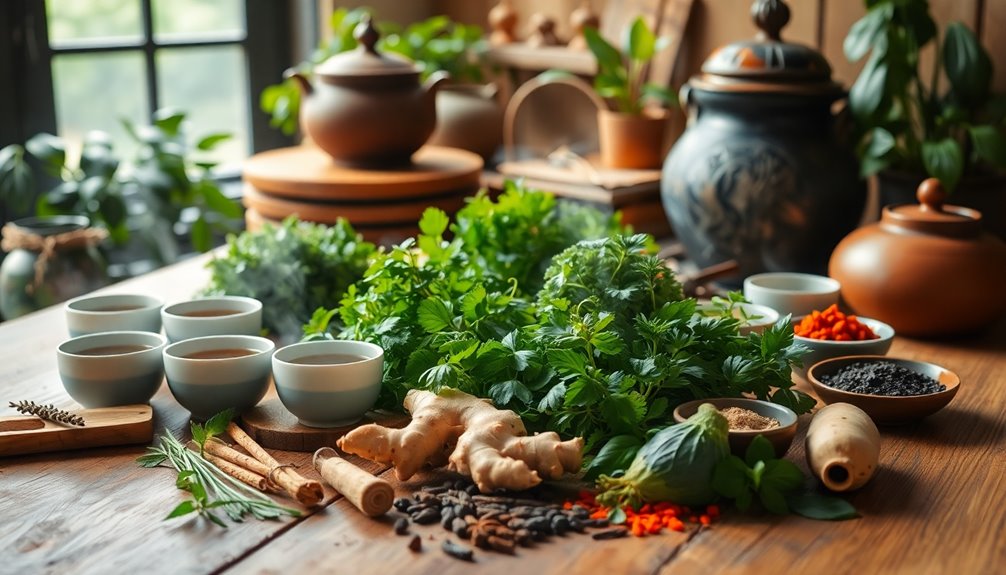
Although modern medicine offers numerous solutions for digestive issues, many people still turn to ancient remedies that have stood the test of time. Herbal teas like peppermint, ginger, and chamomile are perfect examples.
Peppermint helps relax your digestive muscles, making it easier for your tummy to feel good. Ginger is well-known for reducing nausea, which can be a real lifesaver. Additionally, diversifying your dietary sources can provide a broader range of nutrients that support gut health. Regular consumption of essential oils can also enhance digestive function through their therapeutic properties.
Fennel seed tea was enjoyed in ancient Egypt and Greece, helping with bloating and gas. Isn't it amazing how these traditions continue today?
Chamomile tea, used since ancient times, works wonders by calming intestinal spasms and stimulating the release of digestive enzymes. This makes it a favorite for soothing digestive discomfort.
Licorice root is another ancient remedy that supports your liver and improves digestion. These herbal teas connect us to our history while promoting digestive health in our lives today. Additionally, incorporating chia seeds into your diet can further enhance digestive health due to their high fiber content and ability to promote bowel regularity.
Safety of Herbal Interactions
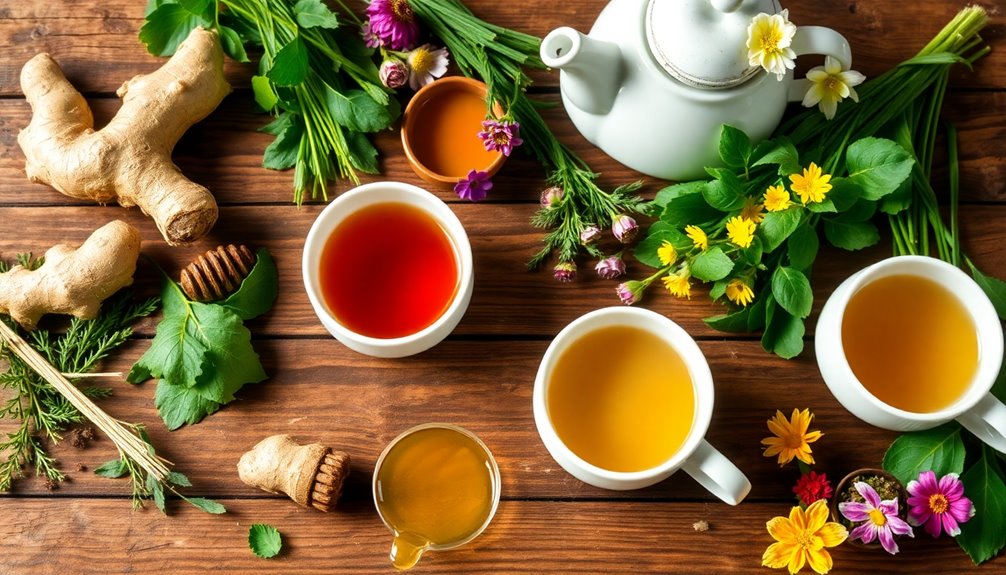
When mixing different herbs, it's crucial to tread carefully, as herbal interactions can lead to unwanted side effects or reduce the effectiveness of certain remedies. You should always research each herb's properties before using them together.
Some herbs, like ginger and turmeric, may interact with blood thinners, increasing the risk of bleeding. If you're on anticoagulant therapy, it's especially important to be cautious. The bond between fathers and daughters can serve as a reminder of the importance of nurturing relationships, much like how we should nurture our health. Additionally, air purifier maintenance can promote a healthier home environment, which may aid in overall well-being.
Licorice root is another herb to watch out for; it can raise blood pressure and interact with diuretics. If you have hypertension, consult healthcare professionals before consuming it.
Additionally, certain herbal combinations can either enhance or inhibit how well medications work. For example, St. John's Wort can reduce the effectiveness of antidepressants and birth control pills.
If you're pregnant or breastfeeding, it's wise to avoid specific herbs like chamomile and fenugreek, as they may have uterine-stimulating effects or affect milk production.
Always prioritize safety in your herbal use, and remember that knowledge is your best friend. Enjoy your tea recipes, but be mindful to keep your health in check! Furthermore, it's important to consult a professional if you're considering using herbal remedies alongside vet-approved recommendations for any existing health conditions.
Practical Applications
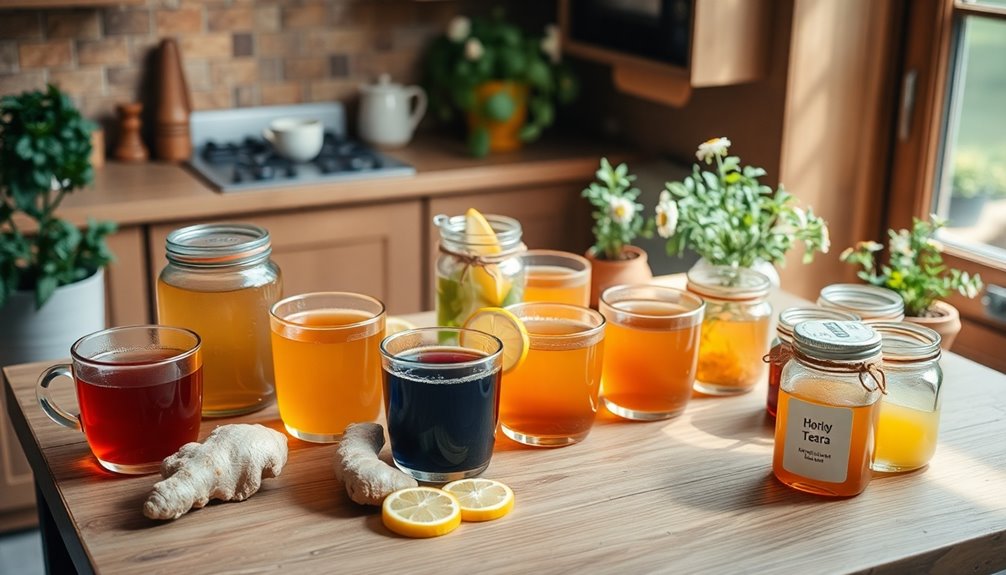
Exploring practical applications of herbal teas can significantly enhance your gut health. You can brew delightful tea blends using peppermint, ginger, and chamomile to soothe digestive discomfort. These warm drinks can help relieve bloating and indigestion, making you feel better. Additionally, some herbal blends, like those containing anti-inflammatory properties, can provide added relief for digestive issues. Herbal teas can also be rich in antioxidants, which may further support digestive health.
Think about adding mucilaginous herbs like slippery elm and marshmallow root; they create a protective lining in your stomach, which reduces inflammation and irritation.
For an extra boost, toss in prebiotic ingredients like dandelion root and licorice root. These can stimulate bile production and promote beneficial gut bacteria, keeping your digestion happy. You might even like to customize your tea with carminative herbs like fennel and cinnamon to reduce gas and bloating.
Drinking warm herbal teas regularly isn't just tasty; it can also help stimulate digestion, making it easier for your body to process food and maintain regular bowel movements. Additionally, incorporating probiotics from kombucha can further enhance gut health by supporting a balanced microbiome.
Frequently Asked Questions
What Tea Heals the Gut?
When you're looking for tea that heals your gut, consider peppermint for relaxation, ginger for digestion, chamomile for soothing spasms, fennel for gas relief, and dandelion for liver support. Each offers unique benefits!
What Tea Has the Best Healing Properties?
When considering teas with healing properties, you can't go wrong with ginger for nausea relief, chamomile for calming effects, or peppermint for digestive ease. Each offers unique benefits to support your overall well-being.
What Homemade Tea Helps With Stomach Inflammation?
Homemade teas like ginger, chamomile, and peppermint can effectively soothe stomach inflammation. Ginger stimulates digestion, chamomile relaxes muscles, and peppermint acts as an antispasmodic, making them great choices for your digestive comfort.
How to Make Herbal Tea for Gut Health?
To make herbal tea for gut health, choose herbs like peppermint, ginger, and chamomile. Boil water, steep the herbs for 5-10 minutes, and sweeten with honey. Experiment with flavors to find your perfect blend!
Conclusion
So, why not try making some of these yummy tea recipes? They can really help your tummy feel better and make your gut happy! Remember, using herbs like ginger, peppermint, and chamomile can be super fun and tasty. Plus, it's a great way to enjoy a cozy drink while taking care of your health. So grab your favorite mug, steep some tea, and sip your way to a happier gut! Cheers to your health!

